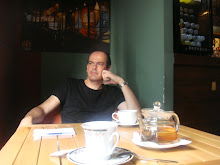Yesterday I came across this story, taken over from the "Southern Weekend", which Roland translated on his ESWN-blog.
Tracking the history of the owners of one of the now infamous brick kilns in Shanxi province, it's a very insightful account of how corruption at the basis works, from it's seemingly harmless origins to it's detrimental results. Go and read it by all means, and don't be frightened by the length, it has some mighty entertaining passages along the way:
Many reporters thought that he had vanished mysteriously over the past 20 or so day. Actually, he was staying alone in a cave in the hill behind the brick kiln and refusing to receive any visitors. On the early morning of June 16, our reporter climbed over the hill and arrived at this s
imple and crude hole to meet this village party secretary who was under a lot of pressure. The 58-year-old man wailed, "At this stage, I am better off killing myself by ramming my head against the wall!"
Could you imagine Saddam in his pit, also "under a
lot of pressure", fending off the US Marines and the international press, saying he refused to receive any visitors ?
What struck me most, however, was this single line near the end of the story:
The various other base-level officials who were interviewed by our reporter all explained: They each have limitations to th
eir job responsibilities and they could not have investigated the illegal brick kilns.
Sad, but all too familiar story, isn't it ? It made me reminisce about one of the movies by that other hero of mine, Akira Kurosawa. Takashi Shimura, next to Toshiro Mifune Kurosawa's fetish actor, plays Kanji Watanabe, the Section Chief at the Public Affairs Office in the Town Hall of some town. He is one of those soulless office clogs that does nothing all day but stamp documents -piles of them with grievances and requests from the towns' people- and by stamping them in practice transferring the responsibility to another department. Until he is diagnosed with cancer of the stomach and he realizes he has only six more months to spend on this earth. He then takes a hard look at his life, and realizes he is a virtual nobody ... and dies halfway the movie. What follows is the reconstruction of Watanabe's last six months through discussions between his former colleagues, family members, city officials ... at his funeral.
It gradually becomes clear that this man, disregarded by his own son, respected by nobody, had decided for himself he had to do at least one thing right in his life, that there had to be at least one thing for which he could be remembered. And so he picked the case of a group of town's women who pleaded (in vain, so far) to have a swamp in their neighborhood transformed in a playground for their children. By way of the conversations and several flashbacks, the audience is then taken along on the crusade of Watanabe through the Kafkaian maze of the Japanese bureaucracy. We see a man who asks, is refused, stalls, is humiliated, but stubbornly goes down all the departments, one by one, until he has collected all the stamps he needs to get the project off the ground. The image of Watanabe, sitting on a swing on "his" playground, while snow is falling down, is as much an image of a man who has finally made peace with himself as it is a tribute to human persistency and what it can achieve.
And so I thought when reading that article: if only those base-level officials had tried a little more and instead of eyeing the limits of their job responsibilities, had rather looked at the possibilities and duties of their jobs, the Shanxi brick kiln scandal (and who knows how many more ?) might not have existed.
By the way, did I mention the title of the movie ? It's "Ikiru" and it means "To Live".









2 comments:
so happy to read this great post
hope to be your friend
i work on new idea and want your help to be able to make it
http://press-hero.blogspot.com/
Hi there,
Thanks for your comment here, always feels good to have people appreciate what you do. But I am not entirely sure what that new idea of you means. I took a look at your blog, saw the free press, democracy, truth ... ideas, but how do you exactly plan to go about it ?
Post a Comment